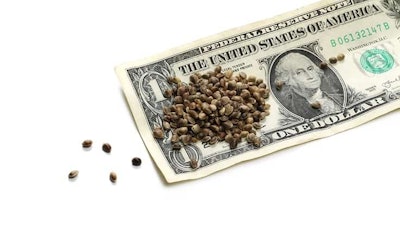
On Monday, the U.S. House of Representatives once again passed the Secure and Fair Enforcement (SAFE) Banking Act with a 321-101 vote.
The act aims to protect institutions providing financial services to state-legal cannabis, hemp and ancillary businesses.
“This bill will provide additional clarity for banks, insurance companies and card processors that they can in fact do business with legally operating hemp businesses,” said Rep. Andy Barr (R-Ky.) during a House floor debate Monday afternoon. “It would also direct our federal financial regulators to update best practices for serving hemp and CBD businesses.”
RELATED: How the Hemp Industry is Overcoming Banking Issues
Despite hemp’s legality on a national level, many industry business owners are still having trouble finding financial institutions that will work with them – especially when it comes to cannabidiol (CBD) businesses. To that end, many industry organizations are supportive of the bill.
But the bill contains a small provision that is concerning to others.
Larry Farnsworth, spokesperson for advocacy agency National Industrial Hemp Council (NIHC), points out that the SAFE Banking Act defines “hemp-related legitimate businesses” as companies that engage in hemp or CBD business “in conformity with the Agricultural [sic] Improvement Act of 2018.”
In other words, those operating in states still running their hemp pilot programs under the Agricultural Act of 2014 (the 2014 Farm Bill) may not be afforded the same protections as those in states with new plans approved by the U.S. Department of Agriculture (USDA).
It’s a huge piece of the puzzle that may be left out, Farnsworth says. As of now, 20 states are still planning on operating under their pilot programs this upcoming season, including some of the country’s biggest producers like Colorado, Kentucky and Montana. (Under the USDA’s final rule, states will be permitted to operate under their pilot programs until Jan. 1, 2022.)
RELATED: 2020 Cultivation Data
Overall, Farnsworth says nearly 75% of the hemp produced in 2020 came from states still operating under pilot programs.
What’s more, many farmers still have product leftover from previous years that was produced under pilot programs, Farnsworth says. With the current language of the SAFE Banking Act, banks may be hesitant to service any business dealing with that leftover product.
“Ironically, we’re delegitimizing hemp as a business while we’re allowing the … marijuana industry to access the banking system,” Farnsworth says.
The Good News
Farnsworth says the NIHC is currently working with Congress to amend the bill to include all legally operating hemp businesses, whether working within 2014 or 2018 farm bill framework.
“We would like to see a hemp economy that works for everybody,” Farnsworth says.
Aside from that provision, the NIHC and other industry groups are largely supportive of the SAFE Banking Act.
The bill has gone through several iterations over a span of a few years. According to U.S. Hemp Roundtable, language revolving around hemp and CBD businesses was added to the mainly cannabis-driven bill in late 2019. Importantly, the bill also clarifies that hemp businesses are not subject to the same scrutiny needed for adult-use cannabis.
The House has passed the SAFE Banking Act three times since 2019, but each time, it failed in the Senate. The bill now heads to the Senate for a vote once again.
“Prospects for the bill appear brighter this year with the change in control of the Senate,” U.S. Hemp Roundtable writes on its website. “And the bill itself is much improved to explicitly protect financial and credit card transactions for hemp farmers and processors, as well as businesses engaged in the handling, manufacturing and sale of hemp-derived cannabinoid products such as CBD.”
Hemp Grower Associate Editor Tony Lange contributed to this report.
























